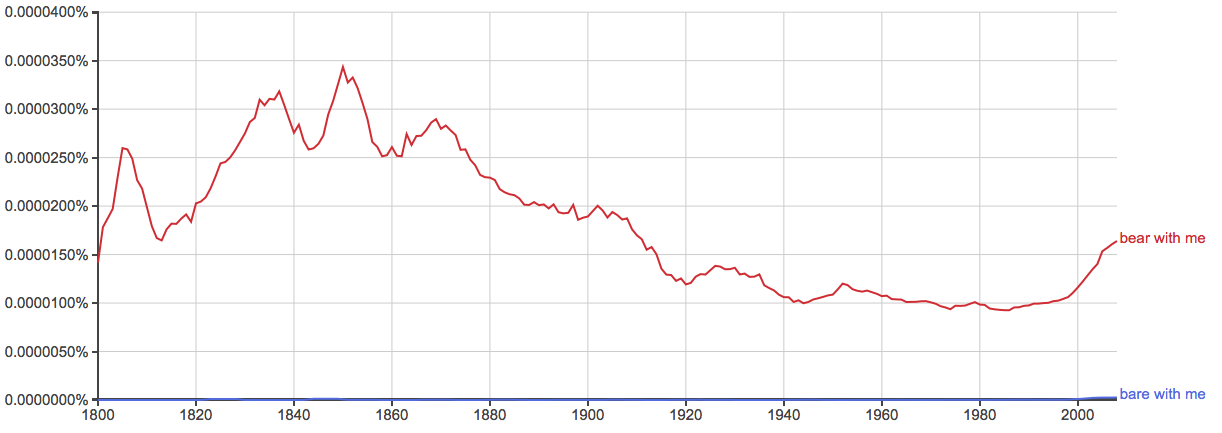Bear With Me vs. Bare With Me: What’s the Gist?
- Bear with me is the correct spelling of the phrase. It is a request for forbearance.
- Bare with me is a misspelling of bear with me.
Continue reading to see why bear with me is the correct spelling.

Most people enjoy a good pun, and writers are no exception. The playwright William Shakespeare, the most famous English writer of them all, was notorious for making bawdy wordplay a staple of even his darkest tragedies.
Are puns appropriate for professional writing, though? The difference in meaning between the verbs bear and bare in the phrase bear with me escapes some writers before a careful round of proofreading.
In this article, I will address this difference so that you will always be at your professional best in formal contexts.
What is the Difference Between Bear With Me and Bare With Me?
In this article, I will compare bare with me vs. bear with me. I will use each of these phrases in at least one example sentence, so you can see them in context.
Plus, I will show you a helpful memory trick that will make choosing bear with me or bare with me an easier task.
How to Use Bear With Me
Bear with me definition: Bear with me is an expression that means hear me out or be patient. A convention speaker might say bear with me if his or her slideshow isn’t working, or a minister might use the phrase while turning to the correct scriptural passage.
Here are a few other examples,
- “Bear with me while we sort out these technical difficulties,” said the radio DJ.
- “This will be a long lecture, but bear with me because at the end there will be a quiz,” warned the professor.
- “I know you’re angry, but bear with me while I explain myself,” said Elliot’s boyfriend.
How to Use Bare With Me
Bare with me definition: Bare with me is a misspelling of the same phrase. Bare and bear are both verbs, so the mistake is easy to make.
Bare, though, means to expose or to uncover when used as a verb. If you use the phrase bare with me, you might cause your readers to question your intentions.
Just in case you still aren’t convinced, here is a chart that shows the relative usage of bare with me vs. bear with me in English:

As you can see, the phrase bare with me is so infrequently used that is approximates zero.
The chart isn’t scientific, since it only looks at English books written since 1800, but it is still a useful tool for identifying a long-term trend.
Outside Examples of Bear With Me vs. Bare With Me
Since bare with me is a misspelling, you won’t see it in many publications. However, here are a few examples of bear with me from prominent publications.
- Once we’ve read it, the 72 hours starts. I always say, “This is information that is mandated by the state — just bear with me, it’s going to take me a few minutes …” –New York Magazine
- Bear with me as I provide a bit of context. For decades, I have taught Fitzgerald’s life and works to my students with the express purpose of using his life to demonstrate how deadly the diseases of alcoholism and addiction can be. –PBS.org
- Bear with me. As many commenters have pointed out, her recovery from the head injury seemed very speedy. –The Guardian
How to Choose Between These Phrases
If you are writing certain genres of fiction, bare with me could be the salacious title of a saucy mass-market paperback.
For the context of patience and forbearance, however, bear with me is the only correct choice. Bare with me might give your readers, of your coworkers, the wrong impression.
Each time you can’t decide whether to use bare with me or bear with me, you should imagine the look on your audience’s faces if you asked them to disrobe. Hopefully, this will dissuade you from using bare with me in formal writing.
Summary
Is it bear with me or bare with me? Bear with me and bare with me are two versions of the same phrase.
- Bear with me is the correct version: it means be patient or hear me out.
- Bare with me is a common error, and its literal meaning is decidedly less professional.
Next time you are tempted to use bare with me in a formal context, imagine how your audience would react if you asked them to disrobe. You should not have any problem avoiding this phrase.
To conclude, bear with me is the correct version of this phrase, not bare with me.
References:
WritingExplained.org/bear-with-me-or-bare-with-me-difference
